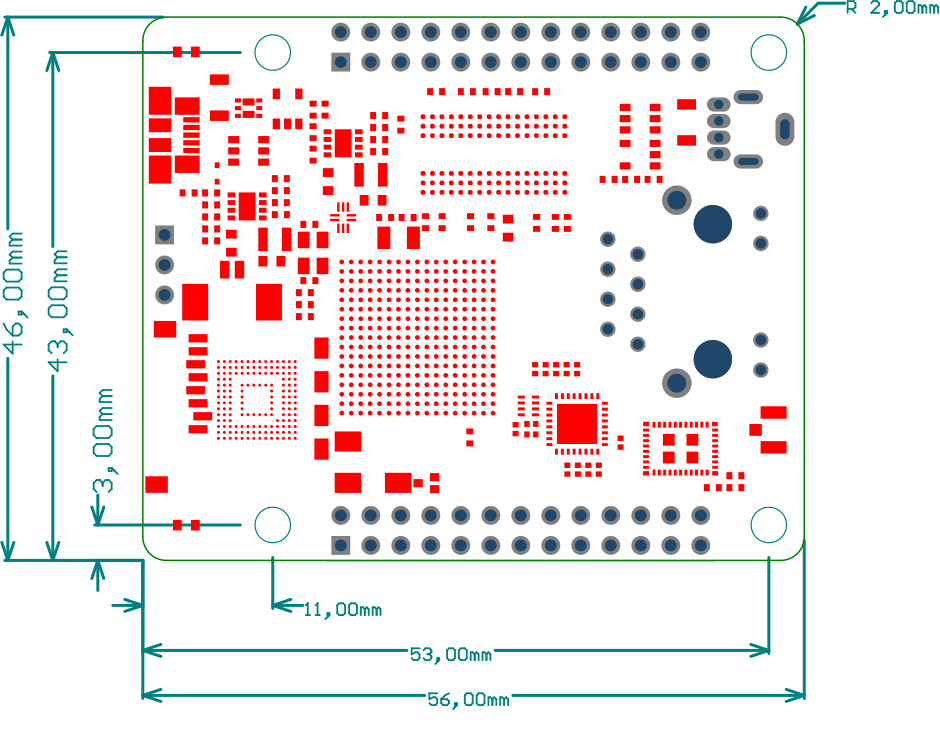StarSBC-6ULL Datasheet and Pinout: Difference between revisions
From SomLabs Wiki
| (16 intermediate revisions by the same user not shown) | |||
| Line 255: | Line 255: | ||
|} | |} | ||
Note: <br /> | Note: <br /> | ||
1. Power supply can be delivered by two ways: J100/J101 or MicroUSB (OTG).<br /> | |||
2. Maximum MPU junction temperature is +105<sup>o</sup>C (industrial version) or +95<sup>o</sup>C (consumer version).<br /> | 2. Maximum MPU junction temperature is +105<sup>o</sup>C (industrial version) or +95<sup>o</sup>C (consumer version).<br /> | ||
== Electrical parameters == | == Electrical parameters == | ||
{| class="wikitable" | {| class="wikitable" | ||
! rowspan="2" | | ! rowspan="2" | SBC<br />signal name | ||
! rowspan="2" | Parameter | ! rowspan="2" | Parameter | ||
! colspan="3" | Value | ! colspan="3" | Value | ||
| Line 268: | Line 269: | ||
| Max. | | Max. | ||
|- | |- | ||
| + | | +5V | ||
| Supply | | SBC supply voltage<sup>1</sup> | ||
| 3. | | 4.85 | ||
| 5 | |||
| 5.15 | |||
| V | |||
|- | |||
| +3.3VO | |||
| Supply voltage for external peripherals | |||
| 3.2 | |||
| 3.3 | | 3.3 | ||
| 3. | | 3.35 | ||
| V | | V | ||
|- | |- | ||
| VGPIO | | VGPIO | ||
| Line 289: | Line 290: | ||
| V | | V | ||
|- | |- | ||
| + | | I<sub>+5V</sub> | ||
| Total Supply Current | |||
| TBD | |||
| TBD | |||
| TBD | |||
| mA | |||
|- | |||
| I<sub>+3.3VO</sub> | |||
| Output current of 3.3V power supply for peripherals<br /> | | Output current of 3.3V power supply for peripherals<br /> | ||
| - | | - | ||
| - | | - | ||
| 0. | | 0.1 | ||
| A | | A | ||
|- | |- | ||
| V<sub>BATT</sub> | |||
| RTC/SNVS Backup<br />Battery Supply | |||
| V | |||
| | |||
| 2.66 | | 2.66 | ||
| - | | - | ||
| 3.6 | | 3.6 | ||
| V | | V | ||
|} | |} | ||
Notes:<br /> | Notes:<br /> | ||
1. | 1. The external voltage connected to pin 2 of J100 and/or J101 or MicroUSB.<br /> | ||
2. Applying the maximum voltage 3.6V results in shorten lifetime. Recommended value is smaller than 3.5V.<br /> | 2. Applying the maximum voltage 3.6V results in shorten lifetime. Recommended value is smaller than 3.5V.<br /> | ||
== | == GPIO connections == | ||
[[File:StarSBC-6ULL-connectors.png|center]] | [[File:StarSBC-6ULL-connectors.png|center]] | ||
| Line 331: | Line 325: | ||
! style="vertical-align:middle;" | Default function | ! style="vertical-align:middle;" | Default function | ||
! style="vertical-align:middle;" | GPIO | ! style="vertical-align:middle;" | GPIO | ||
! style="vertical-align:middle;" | Ball | ! style="vertical-align:middle;" | Ball number BGA289 | ||
! style="vertical-align:middle;" | Notes | ! style="vertical-align:middle;" | Notes | ||
|- style="text-align:center;" | |- style="text-align:center;" | ||
| Line 851: | Line 845: | ||
Note: | Note: | ||
<br>1. WiFi radio module is connected to SDIO1 interface. | <br>1. WiFi radio module is connected to SDIO1 interface. | ||
<br>2. Power supply (5V) for SBC can be connected to pin 2 of J100 or 101 or MicroUSB connector. | |||
== Software loading - BOOT0 jumper == | == Software loading - BOOT0 jumper == | ||
Latest revision as of 13:14, 30 December 2023

StarSBC-6ULL Datasheet and Pinout
General description
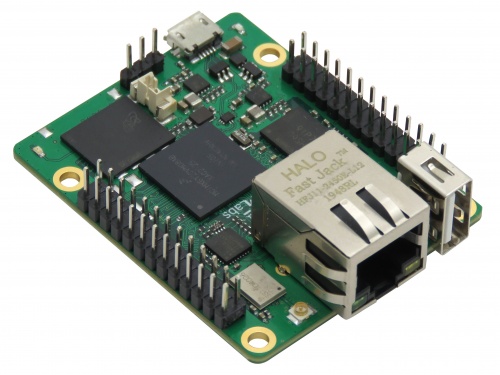
The StarSBC-6ULL SBC (Single Board Computer) is small but powerful IoT Sensor Hub, optimized for operation in applications requiring a large number of communication interfaces. The StarSBC-6ULL is equipped with on-board PHY 10/100 Mb/s Ethernet interface, Murata 1DX radio module (integrated WiFi/BLE), USB host and USB-OTG interfaces. The StarSBC-6ULL supports connections to a variety of interfaces: I2C, SPI, UART and CAN. Additionally the StarSBC-6ULL module is equipped with easy to use 2×26 pin connectors with 40 GPIOs for any use in user application.
The StarSBC-6ULL can be optionally equipped with communication expander module SLH2-comm, which is equipped with 2 x CAN, 2 x RS485, 2 x RS232 physical layers interfaces.
The StarSBC-6ULL supports industrial grade embedded applications.
Applications
- IoT Sensor Hubs
- Home Appliances
- IoT gateways
- Protocol converters
- Home Automation – Smart Home
- Point-of-sales (POS) terminals
- Cash Register
- 2D barcode scanners and printers
- Smart grid infrastructure
- Residential gateways
- Outdoor equipment
Features
- Powered by NXP i.MX 6ULL application processor
- Core clock up to 900MHz
- Up to 1GB RAM DDR3L
- Up to 32GB eMMC
- Optional Murata 802.11b/g/n Wi-Fi and Bluetooth v5.1 module
- Power-efficient and cost-optimized solution
- Ideal for industrial IoT and embedded applications
- Integrated security features
Pictures of SBC versions
| Version | Photo |
|---|---|
| eMMC |
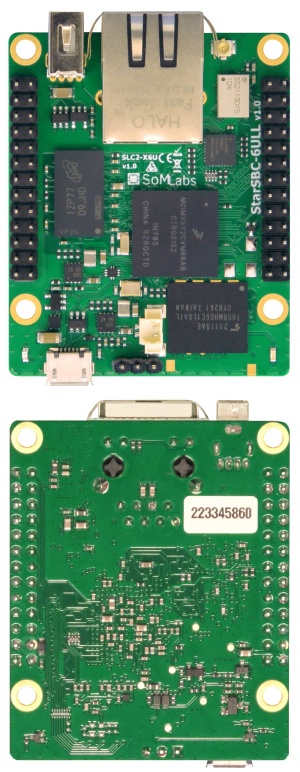 |
| Wi-Fi and Ethernet PHY10/100 are available as an options. |
Ordering info
| SLC | Product type SLC - Single Board Computer |
| 2 | Form factor 2 - StarSOM |
| X6 | CPU Family X6 - i.MX6 |
| CpuType | CPU Type Y2 - i.MX6 ULL Y2 |
| Clock | CPU Clock Speed 528C - 528MHz 792C - 792MHz 900C - 900MHz |
| RamSize | DDR3 RAM Size 64R - 64MB 128R - 128MB 256R - 256MB 512R - 512MB |
| FlashSize | Flash Size Type and Density 04GE - 4GB eMMC 08GE - 8GB eMMC 16GE - 16GB eMMC 32GE - 32GB eMMC |
| SF | Special Features 0SF - No Special Features 1WB - Built-in Murata 802.11b/g/n Wi-Fi/Bluetooth v5.1 2ET - Built-in Microchip 100Mb Ethernet PHY 3WE - Built-in Murata 802.11b/g/n Wi-Fi/Bluetooth v5.1 and Microchip 100Mb Ethernet PHY |
| TEMP | Operating Temperature C - Consumer: 0 to +70 C E - Extended: -25 to +70 C I - Industrial: -40 to +85 C |
Block Diagram
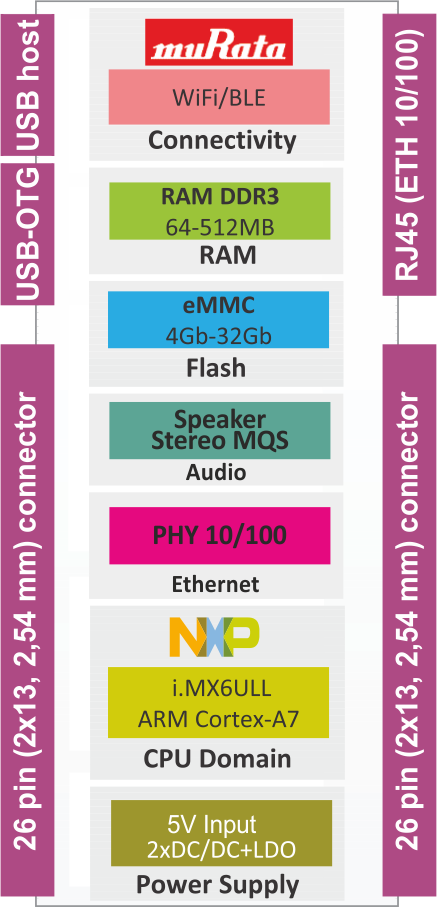
Operating ranges
| Parameter | Value | Unit | Comment |
|---|---|---|---|
| Power Supply | Connected to J100 or J101 or USB conenctors1 | ||
| GPIO voltage | - | ||
| Environment temperature2 | oC | Industrial range w/o WiFi module | |
| Industrial (extended) range with WiFi module | |||
| Consumer range |
Note:
1. Power supply can be delivered by two ways: J100/J101 or MicroUSB (OTG).
2. Maximum MPU junction temperature is +105oC (industrial version) or +95oC (consumer version).
Electrical parameters
| SBC signal name |
Parameter | Value | Units | ||
|---|---|---|---|---|---|
| Min. | Typ. | Max. | |||
| +5V | SBC supply voltage1 | 4.85 | 5 | 5.15 | V |
| +3.3VO | Supply voltage for external peripherals | 3.2 | 3.3 | 3.35 | V |
| VGPIO | GPIO Input Voltage | 0 | 3.3 | 3.62 | V |
| I+5V | Total Supply Current | TBD | TBD | TBD | mA |
| I+3.3VO | Output current of 3.3V power supply for peripherals |
- | - | 0.1 | A |
| VBATT | RTC/SNVS Backup Battery Supply |
2.66 | - | 3.6 | V |
Notes:
1. The external voltage connected to pin 2 of J100 and/or J101 or MicroUSB.
2. Applying the maximum voltage 3.6V results in shorten lifetime. Recommended value is smaller than 3.5V.
GPIO connections
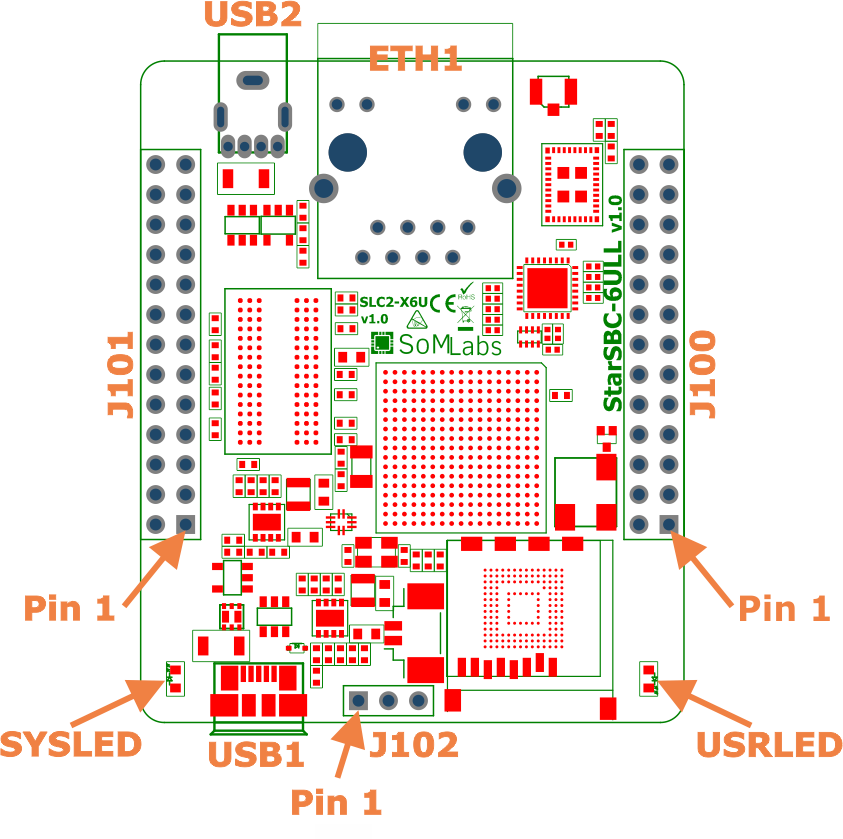
| Connector pin number | Default function | GPIO | Ball number BGA289 | Notes |
|---|---|---|---|---|
| J100 | ||||
| 1 | +3,3VO | +3,3V power output (max. 100 mA) - paralelly connected to pin 1 of J101 | ||
| 2 | +5V | External power supply (power source) 5V - paralelly connected to pin 2 of J101 | ||
| 3 | UART8-RXD | ENET2_TX_EN | B15 | |
| 4 | GND | |||
| 5 | UART8-TXD | ENET2_TX_DATA1 | A16 | |
| 6 | UART3-TXD | UART3_TX_DATA | H17 | |
| 7 | PWM5 | LED_DATA18 | A13 | |
| 8 | UART3-RXD | UART3_RX_DATA | H16 | |
| 9 | GND | |||
| 10 | UART3-CTS | UART3_CTS | H15 | |
| 11 | UART4-RXD | LCD_ENABLE | B8 | |
| 12 | UART3-RTS | UART3_RTS | G14 | |
| 13 | UART4-TXD | LCD_CLK | A8 | |
| 14 | GND | |||
| 15 | I2C4-SDA | LCD_DATA02 | E10 | In I2C mode external pull-up resistor is necessary (no any internal pull-up) |
| 16 | I2C3-SDA | LCD_DATA00 | B9 | In I2C mode external pull-up resistor is necessary (no any internal pull-up) |
| 17 | I2C4-SCL | LCD_DATA03 | D10 | In I2C mode external pull-up resistor is necessary (no any internal pull-up) |
| 18 | I2C3-SCL | LCD_DATA01 | A9 | In I2C mode external pull-up resistor is necessary (no any internal pull-up) |
| 19 | ECSPI2-MOSI | UART5_TX_DATA | F17 | |
| 20 | UART7-RXD | LCD_DATA16 | C13 | |
| 21 | ECSPI2-MISO | UART5_RX_DATA | G13 | |
| 22 | UART7-TXD | LCD_DATA17 | B13 | |
| 23 | ECSPI2-SCLK | UART4_TX_DATA | G17 | |
| 24 | UART7-CTS | LCD_DATA07 | D11 | |
| 25 | ECSPI2-CS | UART4_RX_DATA | G16 | |
| 26 | UART7-RTS | LCD_DATA06 | A10 | |
| J101 | ||||
| 1 | +3,3VO | +3,3V power output (max. 100 mA) - paralelly connected to pin 1 of J100 | ||
| 2 | +5V | External power supply (power source) 5V - paralelly connected to pin 2 of J100 | ||
| 3 | USB1-DP | Line connected to USB1 channel through MUX (output ENET2_RX_ER, ball D16 is USB1 connection selector). Connected to USB1-DP MPU line if ENET2_RX_ER="0" (USB1-SEL), in another case USB1-DP MPU line is connected to MicroUSB connector (USB-OTG). | ||
| 4 | GND | |||
| 5 | USB1-DM | Line connected to USB1 channel through MUX (output ENET2_RX_ER, ball D16 is USB1 connection selector). Connected to USB1-DM MPU line if ENET2_RX_ER="0" (USB1-SEL), in another case USB1-DM MPU line is connected to MicroUSB connector (USB-OTG). | ||
| 6 | GPIO-6 | GPIO1_IO06 | K17 | |
| 7 | GPIO3.17 | LCD_DATA12 | C12 | |
| 8 | GPIO-7 | GPIO1_IO07 | L16 | |
| 9 | GND | |||
| 10 | GPIO-8 | GPIO1_IO08 | N17 | |
| 11 | CAN1-TX | LCD_DATA08 | B11 | |
| 12 | GPIO-9 | GPIO1_IO09 | M15 | |
| 13 | CAN1-RX | LCD_DATA09 | A11 | |
| 14 | GND | |||
| 15 | CAN2-TX | LCD_DATA10 | E12 | |
| 16 | GPIO3.2 | LCD_HSYNC | D9 | |
| 17 | CAN2-RX | LCD_DATA11 | D12 | |
| 18 | GPIO3.3 | LCD_VSYNC | C9 | |
| 19 | MQS-R | LCD_DATA22 | A14 | |
| 20 | UART2-RXD | UART2_RX_DATA | J16 | |
| 21 | MQS-L | LCD_DATA23 | B16 | |
| 22 | UART2-TXD | UART2_TX_DATA | J17 | |
| 23 | GPIO3.25 | LCD_DATA20 | C14 | |
| 24 | UART2-CTS | UART2_CTS | J15 | |
| 25 | GPIO3.26 | LCD_DATA21 | B14 | |
| 26 | UART2-RTS | UART2_RTS | H14 | |
| J102 | ||||
| 1 | UART1-TXD | UART1_TX_DATA | K14 | TxD line of Linux console port (LV-TTL logic levels) |
| 2 | UART1-RXD | UART1_RX_DATA | K16 | RxD line of Linux console port (LV-TTL logic levels) |
| 3 | GND | |||
| Another functions | ||||
| BUZZER | GPIO1_IO05 | M17 | Electromagnetic speaker control output (thru NPN driver) | |
| SYSLED | ENET2_TX_CLK | D17 | System or user LED control output (heartbeat by default, thru NPN driver) | |
| USRLED | LCD_DATA14 | A12 | User LED control output (thru NPN driver) | |
| WDOG-B | LCD_RESET | E9 | Used by system, do not modify default configuration | |
| ENET-MDIO | ENET2_RX_DATA0 | C17 | ||
| ENET-MDC | ENET2_RX_DATA1 | C16 | ||
| ENET1-RST | ENET2_RX_EN | B17 | ||
| ENET1-INT | ENET2_TX_DATA0 | A15 | ||
| USB1-SEL | ENET2_RX_ER | D16 | ||
| USB1-ID | GPIO1_IO00 | K13 | ||
| USB1-VBUS-OC | GPIO1_IO01 | L15 | ||
| USB1-VBUS-EN | GPIO1_IO04 | M16 | ||
| USB2-VBUS-OC | GPIO1_IO03 | L17 | ||
| USB2-VBUS-EN | GPIO1_IO02 | L14 | ||
| WiFi and BLE module connection | ||||
| BT-ENABLE | CSI_MCLK | F5 | ||
| WLAN-HWAKE | CSI_PIXCLK | E5 | ||
| BT-HWAKE | CSI_VSYNC | F2 | ||
| BT-WAKE | CSI_HSYNC | F3 | ||
| BT-RXD | CSI_DATA00 | E4 | UART5 | |
| BT-TXD | CSI_DATA01 | E3 | UART5 | |
| BT-RTS | CSI_DATA02 | E2 | UART5 | |
| BT-RTS | CSI_DATA03 | E1 | UART5 | |
| BT-PCM-SYNC | CSI_DATA04 | D4 | ||
| BT-PCM-CLK | CSI_DATA05 | D3 | ||
| BT-PCM-OUT | CSI_DATA06 | D2 | ||
| BT-PCM-IN | CSI_DATA07 | D1 | ||
| CLK32kHz | JTAG_CTK | M14 | Clock output to 1DX radio module (WiFi/BLE) | |
| JTAG_MOD | JTAG_MOD | P15 | Permanently connected to GND | |
| BOOT_MODE1 | BOOT_MODE1 | U10 | Permanently connected to GND | |
Note:
1. WiFi radio module is connected to SDIO1 interface.
2. Power supply (5V) for SBC can be connected to pin 2 of J100 or 101 or MicroUSB connector.
Software loading - BOOT0 jumper
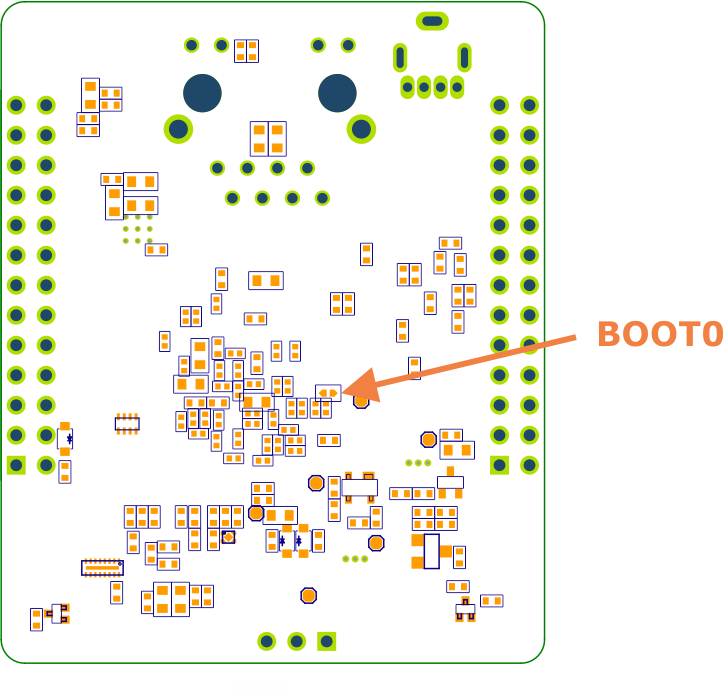
If BOOT0 jumper is open - MPU starts normally (software from MMC memory is loading).
If pins of BOOT0 jumper are connected to each other, bootloader starts (active on USB1).
RTC battery connection
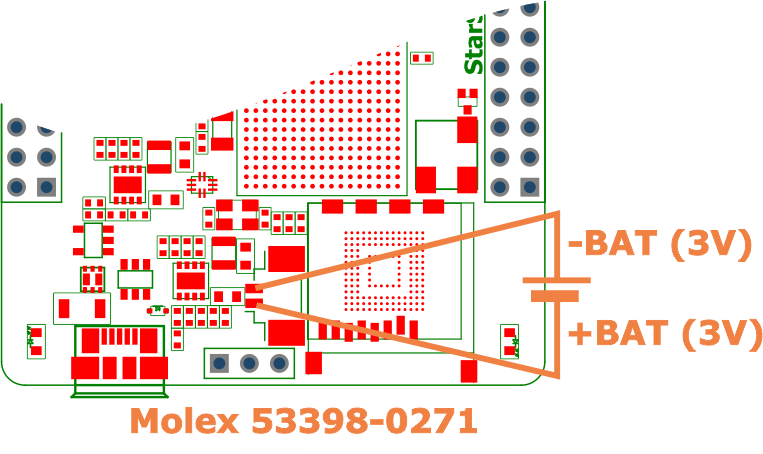
Dimensions
